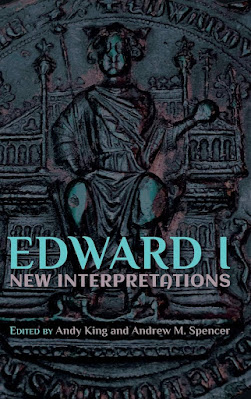To paraphrase the late, great RR Davies, Edward I of England is the second most divisive figure in British history after Oliver Cromwell. Since the 1950s his reputation among historians has jerked up and down like the proverbial yo-yo, influenced by the usual drivers of revisionism and counter-revisionism. The perception of the general public is a different matter: to them Edward I is the pantomime villain of Braveheart and various popular novels, as well as the go-to bogeyman for Welsh and Scottish nationalists.
In recent years Edward’s reputation has been somewhat rehabilitated. From the cyclic low of the early 1970s, historians such as Caroline Burt, Andrew Spencer and Andy King have all presented more positive appraisals of the reign, while Michael Prestwich - the Godfather of Edwardian studies for the past forty years - has revised the negative assessments of his early career. This latest study, Edward I: New Interpretations, continues the general upward curve while also highlighting Edward’s flaws and failures.
To begin with, this is not a biography in the style of Prestwich or Marc Morris. Instead the editors, Spencer and King, have compiled a series of essays by different contributors. Each chapter addresses different aspects of the reign. These range from Edward’s administration of justice before he came to the throne, his relationship with Scottish magnates, his veneration of the Virgin Mary, and so on. Each contributor has published on their chosen subject and the depth of research and analysis is impressive, even if one doesn’t always agree with the conclusions.
There is much more good than bad to be found in this volume, so it might be easier to deal with the latter first. Edward’s life and times were packed, and it is impossible to cover everything in a book that struggles to reach the 200-page mark. There is no mention of Wales, the Jews, Gascony, the Holy Land, Edward’s relations with Philip IV and other European monarchs, Flanders, the Grand Alliance, the Riccardi, Simon de Montfort, Charles of Salerno, Henry of Castile, William Wallace, Robert de Bruce…the list goes on, and might indeed go on forever. The editors were obviously working within space limits, but their choices are arguably questionable. Should the conquest of Wales, for instance, be relegated at the expense of Edward’s devotion to the cult of Mary? The latter, it is true, casts fresh light on the king’s religious devotions: yet one might argue that this is a side-issue at best, compared to his controversial relations with the Welsh. A chapter by David Stephenson, who has written extensively (and recently) on Edwardian Wales, would have been ideal.
Otherwise it is difficult to fault the evidence and arguments presented here. My personal favourite is Kathleen Neal’s eye-opening discussion of the nature of letters and discourse in this era. I was vaguely aware that kings did not pen their own correspondence, but the subtlety and labour that went into producing just one royal letter or instruction almost defies belief. As Neal elaborates, royal correspondence was very much a team effort, composed by specialist clerks trained to enact the king’s will. Michael Brown’s article on Edward’s ultimate failure to conquer Scotland, based on his fundamental inability to understand the Scottish magnates, comes a close second. Again, though, the decision to omit Wales and include Scotland seems odd. A comparison between the Scots and Edward’s more successful relationship with the Welsh gentry would have been apt.
I may as well address the sullen, glowering elephant in the room. For those whom Edward Longshanks is simply the Big Bad, a cardboard prop to pre-conceptions and emotional needs, a book such as this will hold little interest. Any positive assessment of this particular Plantagenet tends to get written off as a whitewash, a twisted attempt to rehabilitate medieval England’s very own Stalin (or, at best, Khrushchev). Nothing sticks like a good cliché, especially with a grudge to compel it. One can argue that Edward was no different in his attitudes and behaviours - repellent as they may seem - than most of his peers, but in the end it gets boring. Why bother? To paraphrase another clever chap, whose name escapes me at the moment: I have tried these people in the morning, and in the evening, and found in them nothing but spite. Let them bide.
To be less condemnatory for a moment, there is also the issue of price: the book retails at about £60. This is common among specialist publishers, but scarcely calculated to make it leap off the shelves. As a result the fresh arguments and ideas presented here will disseminate among a very small audience, which makes me wonder who the book is aimed at. Is it meant to appeal to the general reading public at all, or a strictly limited academic/university circle? I cannot imagine the editors set out to publish on the behalf of eccentrics like me, who are quite prepared to shell out their dough for slender (if juicy) pickings.

No comments:
Post a Comment